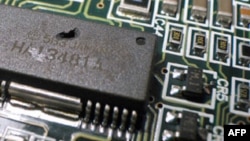Scientists from University of Texas said this week that they had created what was previously possible only in theory: a one-atom-thick form of silicon, the material essential for production of transistors, the basic elements of all computer chips.
The exotic material, called silicene, has all the electrical properties needed for production of much smaller and faster semiconductors.
One of the critical properties of today’s computer chips is the distance electrons must travel from one transistor to the next. In transistors that are only one atom thick, the distance and time that signals travel during information processing would obviously be reduced.
The new material was notoriously difficult to work with, but the University of Texas scientists said they developed a method to handle the silicene by keeping it between two protective layers.
The new method is not ready yet for production, but scientists said it was an important step toward a commercially viable, low-energy, high-speed digital computer chip.
